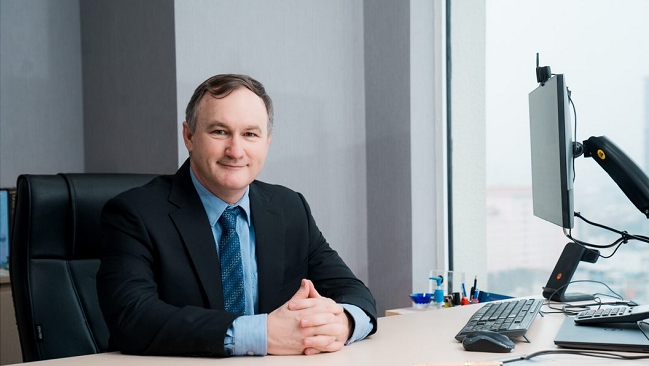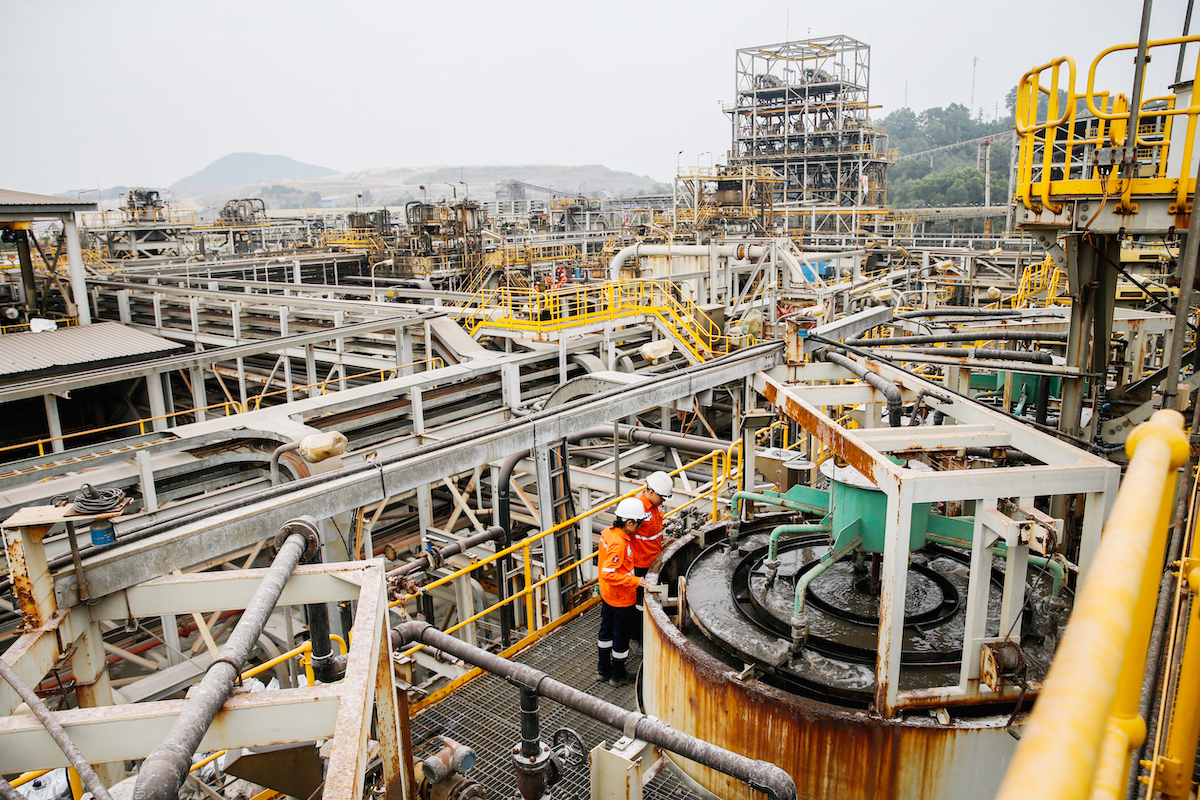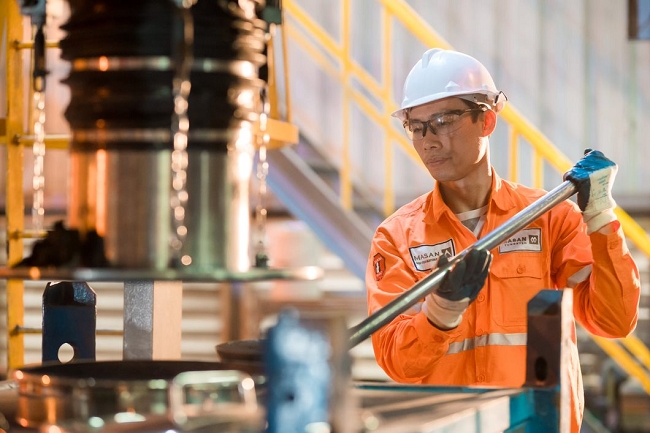Vietnam turns semiconductor vision into action
The global semiconductor industry is being reshaped by geopolitical tensions, shifting supply chains, and the surge of digital technologies.




Craig Richard Bradshaw, CEO of Masan High-Tech Materials, shares the company’s ambition to turn Vietnam into the world's leading supplier of high-quality tungsten.

Masan High-Tech Materials (MHT) is the third largest tungsten producer and supplier in the world and plans to expand its tungsten recycling business in Vietnam. The company is in the process of seeking government approval to import tungsten scraps into the country and build a new plant for recycling.
Why do you think Vietnam can become the biggest global tungsten recycling centre and what are the MHT’s ambitions in this sector, given these positive circumstances?
Craig Richard Bradshaw: Masan High-Tech Materials, formerly Masan Resources, restarted on June 18, 2010, when we were zero. In less than 13 years, we have transformed from the idea of the Nui Phao project into the largest tungsten mine outside China, to the third-largest tungsten company and the largest tungsten recycling company in the world. A very short time!
There are still great opportunities for us ahead. We believe that we just need to be consistent with the goal of sustainable development, towards recycling different materials, taking advantage of our world-class recycling technology that we have in H.C. Starck, Germany into Vietnam.
In addition, Vietnam is a country with a young population, many talented young people, and a quick grasp of technology.
We are currently constructing a pilot recycling plant in Germany, but our ultimate goal is to commercialize it there. In the long term, we can commercialize the same technology in Vietnam, Canada, China and other regions where we operate our tungsten business.
We are the third largest tungsten producer and supplier in the world, behind only two Chinese companies, we also have a large recycling business for tungsten, with most of our recycling occurring in Germany.
However, we want to expand our recycling business in Vietnam, and we are in the process of seeking government approval to import tungsten scraps into Vietnam. We can recycle 100 per cent of the tungsten scraps and recover the tungsten, cobalt, and nickel from them. Then we can turn them back into new products. That’s why we need to work with the government, because the current legislation does not allow us to import tungsten scrap into Vietnam for processing.
There is not enough scrap produced in Vietnam as a byproduct of manufacturing to support an economic recycling plant or factory. So, we need to work with the government to get the approvals to import tungsten scrap from other countries. From there, we will expand our operations in Vietnam to enable more tungsten scrap recycling to take place.
What do you think is the key to a successful Tungsten recycling project in Vietnam?
Craig Richard Bradshaw: The key to a successful recycling project in Vietnam is raising awareness of our people and policy makers.
Of course, we do not want to become the dumping ground or the landfill for the rest of the world's waste. Therefore, whatever technology we use has to be able to recover 100 per cent of the material components, so that they can either be exported as new products or used in Vietnam's own industries.
There are two important factors for recycling, one is technology, and the other is strategic partnerships with other customers who can use the recycled products.
For example, I may be able to extract tungsten, copper and nickel from the waste materials, and process them into finished products. However, for lithium, I may only be able to process it into an intermediate product, and then, pass it on to someone else who can make a finished product out of it.
Not every company will have the capability to process all the different materials to the final stage. Therefore, we have to make sure that whatever we cannot process, we can hand it off to someone else who can. This way, we can achieve sustainability and avoid waste.
The current recycling strategy of Vietnam is still an aspiration. We have to work with the government to help them frame the decrees that will enable recycling to happen in Vietnam in an economical, viable and sustainable way.
Samsung uses tungsten tools to make phones. I can recycle those tungsten tools in my factory engine, but I can’t do that in Vietnam, because I don’t have the equipment here.
However, we want to build a recycling facility in Vietnam, but if we do that, we will need to import scrap tools from Korea, Taiwan, Thailand, and Japan and recycle them here. There is not enough tungsten scrap in Vietnam to make it economically viable.
It may take a long time to get the import permit as the policy makers are worried out the environmental impact of importing the tungsten scrap. What can you do to convince them to grant the permit?
Craig Richard Bradshaw: The import of scrap is banned in Vietnam, except for five materials, including steel, copper, aluminum, and two others. Therefore, we are not allowed to import tungsten scrap for recycling in Vietnam.
However, we have a safe and top-notch process that we can replicate from our facility in Germany and apply it in Vietnam. This process is world-class and environmentally sustainable.
What I have to do is to make the government understand the benefits of recycling tungsten scrap. I have to show them what kind of tungsten scrap we will import, how we will process it, and what products will come out of it.
But at the moment, it is not on the list, so it is something we have to work with the government to get approved.
There are scraps in Asia, from India, Indonesia, Thailand, Japan, Korea, Taiwan, it goes to the US or goes to Europe for recycling and back to Asia, so there's no reason why we can't do it here in Vietnam.
Even in the course of business, many Chinese partners want to approach the MHT to request access to German recycling technology. Why then don't we take advantage of this to bring the position of Vietnam into the global world-class Tungsten map.

What is the key challenge in educating and raising awareness for people of this issue?
Craig Richard Bradshaw: It’s the lack of understanding.
I talked to the local government officials in Dai Tu district of Thai Nguyen province, and they are concerned about recycling and what happens to what remains. They are concerned about stopping landfills for the rest of the world.
It is incumbent to demonstrate this technology. We will recover 100 per cent of it into its minerals, so that it can be repurposed into a finished product. So if I get a drill bit finish from a woodworking tool or so, or finishing from its production capability that is now broken and needs to be recycled, we can recover all of the constituent parts.
Masan High-Tech Materials seems to be confident of the recycling technology that H.C. Starck is doing well in Germany. However, is there any recycling model in the world that can recycle other kinds of scraps, apart from tungsten scrap, and then we can showcase to the Vietnamese government as an example of a successful recycling process?
Craig Richard Bradshaw: If you look at the car industry, recycling has been operating successfully and sustainably for a long period of time. Besides, there are big global industries like Busy that have been doing this for a long period of time. If you use some of these industries as benchmarks, it requires a different science than cardboard. Four times, they looked for other metals, but as their process from collection to processing to repurposing is a good model in Australia.
Consider the fact that H.C. Starck with recycling technology has been successful in Germany for more than 100 years. Why would the German government allow them to continue doing so for so long in a developed nation like Germany, if it is a dump right? We can completely recycle from scrap sources and leave no trash owing to modern technology from the H.C. Starck.
Scrap components are becoming more complicated and contain a wide variety of materials. However, as science advances, we will collaborate with a wide range of partners worldwide to complete this purpose. As the items are becoming increasingly advanced, the recall will vary depending on the mineral; thus, we must adapt.
When the government requires manufacturing factories to obtain back the used battery or used car, can MHT get those scrap from those companies to do recycling?
Craig Richard Bradshaw: One of the challenges of black mass recycling is that the black mass or battery waste comes from two sources. One source is from the manufacturing process of the batteries, which generates about 10 to 30 percent of waste material that needs to be recycled. The other source is the end-of-life batteries that are returned by customers after 3 to 7 years of use.
This creates two scale issues for recycling, one is recycling during the manufacturing process and the other is recycling at the end of the battery life.

At the moment, there is no scale in Vietnam, because there are no large gigawatt factories producing batteries in Vietnam that would make it economical to set up a recycling center.
Most of the recycling centers are located where the large gigawatt factories are, so that they can use the waste material from the manufacturing process to run their recycling process.
The challenge in Vietnam is also that depending on where the products go, the battery goes with the problem. A lot of the industry in Vietnam is for export, not for domestic consumption, so the batteries that are manufactured in Vietnam go somewhere else.
At the moment, the government does not allow the import of batteries or black mass for recycling. Therefore, scale will be an issue until we have a holistic legislative framework that enables holistic recycling, not just for what we sell in Vietnam, but also for what Vietnam sells to the rest of the world.
We are even more excited about the company’s strategic growth of sustainability, focusing on recycling. How does the company position recycling to be one of the advantages of the global tungsten market?
Craig Richard Bradshaw: It is important to understand that the theoretical maximum for recycled tungsten is 70 per cent. At mines in the world, only recovering about 40 per cent of the tungsten that's available. So, the opportunity to increase the recycling from 40 per cent to 70 per cent but 70 per cent is the theoretical maximum. Imagine when you drill into the wall, the problem is tungsten lost in that process.
The same problem when doing construction or you are doing it in a tunnel or building. Some of the tungsten is lost in that process so the tool when it comes back for recycling has normally lost about 30 per cent.
We have many customers who want to increase the volume of recycling in the finished products because it has a lower carbon, and tungsten from recycling has less carbon and less greenhouse gas emissions.
Large nations such as the US or the EU have laws requiring a specific percentage of new products to be made from recycled materials, ensuring that 10–20 per cent of the finished product is made from recycling.
Finding partners with recycling abilities, such as MHT, is required for businesses wishing to sell products to such a market, which has an international impact.
The global semiconductor industry is being reshaped by geopolitical tensions, shifting supply chains, and the surge of digital technologies.
The change in APA approval authority is expected to shorten processing time and enhance business proactiveness in international tax negotiations.
As hybrid cloud systems grow more complex, Vietnamese enterprises are struggling to detect cybersecurity threats moving laterally within their own networks.
The submission of the draft resolution on Vietnam’s international financial center to the National Assembly heralds a new developmental era for the country.
More than just running a 5-star resort, Kristian Petersen is redefining the art of hospitality with a humane and sustainable leadership philosophy.
For Tyna Huynh, co-founder of Drinkizz, organic is not just a food choice but a way of life that fosters a deep connection between people, nature and community.